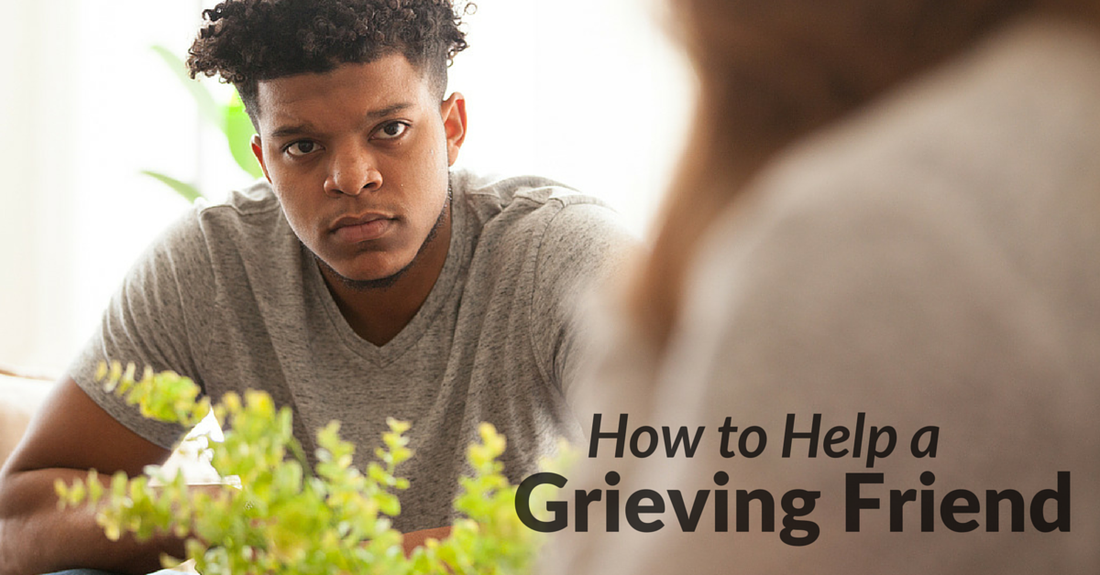|
When the news shows us another tragedy, such as the horrific events that happened at Sandy Hook Elementary School in 2012, it’s unimaginable trying to visualize what the parents and family went through. What do you say to someone who has lost a child? The best thing? Nothing. Often when we see someone going through a hard time, we feel pressured to give some sort of consolation. It’s understandable—we feel bad for the person and we want them to feel better, but many times what a grieving person needs most is not a series of platitudes or bible verses, but simply your presence. Grief is the most complex series of emotions anyone can go through. There’s sadness, anger, rage, despair, confusion and more. Grief can’t be pushed aside, ignored or softened. It has to be experienced. It has to be metabolized. Failure to do this can lead to negative long term effects. It won’t go away unless it’s dealt with. But how? Through the support of other people who care. When you’re grieving, sometimes God doesn’t seem to be there at all. God often doesn’t answer the ‘whys’ during those hard times. We too should refrain from doing so when comforting others. Just be there for them. Sit in a living room in silence with them for a few hours. Listen to them talk about the person they lost. Laugh when they laugh as they remember the good times. Help them feel less alone. They’ll thank you for it. You will be the presence of God to them during those darkest hours. For more on the topic of grief, see: Dealing with Loss
When I was in school, I had several teachers that required us to journal on a regular basis. Of course there were certain parameters and topics we had to cover. We were graded according to how well we followed instructions, and whether our writing was free of spelling and grammatical errors. Many clients I work with have had the same experience with journaling. So when I bring up the fact that journaling has been shown to improve mental health, they are hesitant, approaching it like a school assignment. But this is not what I'm suggesting. James Pennebaker, a social psychologist and researcher, pioneered what is known as the expressive writing method—an intervention that has shown to improve the mental and emotional health of participants. The research done by Pennebaker showed that writing about one's own story can help with coping and processing memories. Here is the step-by-step process for journaling using this method: 1. Find a notebook or journal. It doesn't have to be a fancy leather-bound diary—a simple notebook with lines will do. 2. Time yourself for 15 minutes. Set a watch or the timer on your phone. 3. Write about a specific memory or an issue you are currently dealing with. Don't worry about spelling or grammar. You are not being graded. This is all about getting your emotions out on paper. 4. Do this four days in a row. Try writing before bed when you are winding down, or during some quiet time when you won't be interrupted. Unlike the tedious journaling that many of us did in school, this activity is meant to be freeing. You may find that your entries turn into prayers and one-sided conversations with God on paper. One reason I believe this method works is that you are allowing yourself to process things through free association—the same thing one does during therapy. When traumatic things happen in our lives, we often try to find meaning. Words are meanings, and when you put your experience into words, you might be surprised at the insight and meaning you discover. So there you go. Give it a shot and let me know what happens. Subscribe to My Newsletter
I remember the first time I moved away from home. It was my freshman year in college when I made the trek from Arizona to Kentucky to attend Asbury University. I was excited about starting college, but was going to miss my family who would be 1,800 miles away. Even though exciting things were happening, I was temporarily losing something — constant contact with my family and the familiarity of how my life used to be at home. Grief comes with loss and change. Whenever we think of grief, we think of the sadness that accompanies the death of a loved one. In reality, grief occurs whenever we lose something important to us. While the death of a family member certainly fits the bill, it could be the loss of a relationship through a breakup or divorce, or the loss of a job. Grief also encompasses the change that comes as a result of the loss. Things are no longer as comfortable and we are forced to adjust. Even good things like marriage and the arrival of children means the end of a former way of life that was familiar. How do we get over it? There are healthy ways to grieve but also things we do that may get in the way of healthy grieving. Here are some things to keep in mind:
How to Grieve The only way to get over grief is to grieve. Grief is the most complex series of emotions humans are capable of experiencing. There is no time table for grief. The only way to get through it is to feel it, experience it, and eventually accept it. Some ways to process grief:
Grief is beautiful. During my first semester in college, I finally did feel better about living so far from home. What was harder was the fact that two people in my family died during my second month there—my great-grandmother and my cousin who was like a sister to me. It was hard to grieve so far from my family, but comfort came through several phone calls, some talks with my pastor, and the support of those around me. As I look back, I still feel sad whenever I think about my cousin, Nichole. I realize she's in a better place, but there is still a sadness that remains. And that's okay. It's more like a beautiful sorrow. Feeling loss means you had something that gave you joy to begin with. Grief is difficult but it doesn't negate joy. It makes you human, and makes you feel alive. Every deep cut leaves a scar. You will feel much better eventually—but there may always remain a remnant of sadness. Such experiences nurture a compassion for others going through the same thing—which is exactly what they'll need in the midst of their own loss. You can be the very presence of God to them during a time when you wish you had the same. Subscribe to My Newsletter
|
Article Topics
All
Archives
July 2023
|
We're ready to help. Let's begin.
Peoria LocationInside State Farm
9299 W Olive Ave Ste 212 Peoria AZ 85345 |
Phoenix LocationInside CrossRoads UMC
7901 N Central Ave Phoenix AZ 85020 |
About |
Services |
EducationPrograms
ACPE Spiritual Care Specialist Pastoral Counseling Apprenticeship Deconstruction Course Free Grief Training Contact |
We're ready to help. Let's begin.
© 2024 Prism Counseling & Coaching. All Rights Reserved.
Christian DISC® is a registered trademark of Prism Counseling & Coaching.
Christian DISC® is a registered trademark of Prism Counseling & Coaching.






